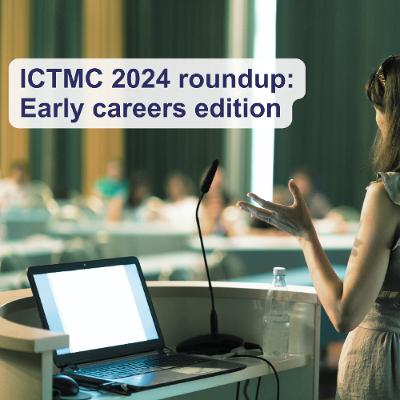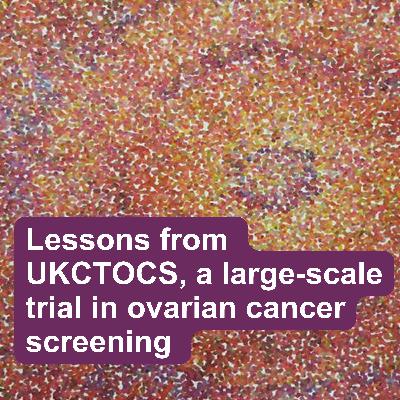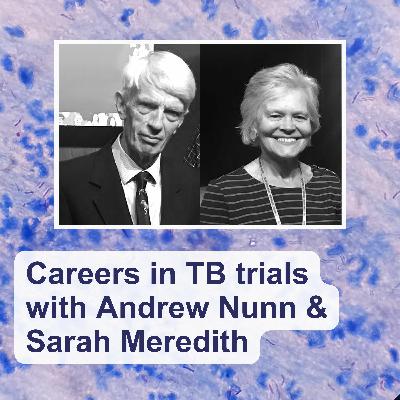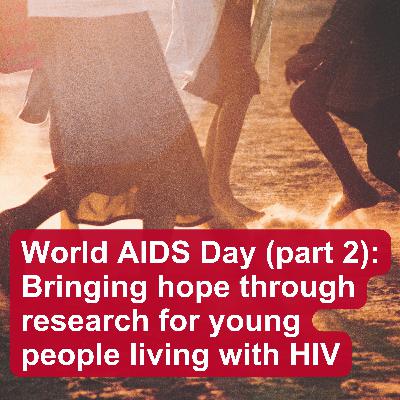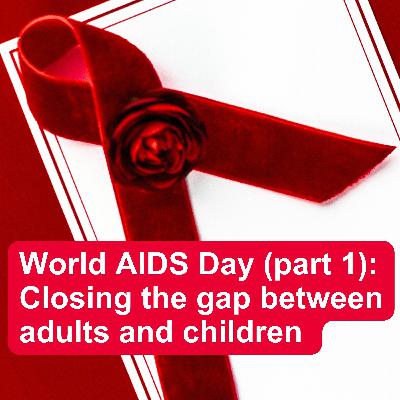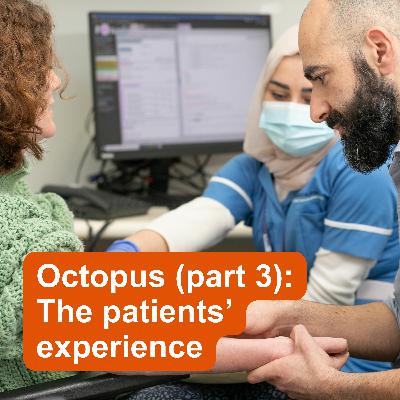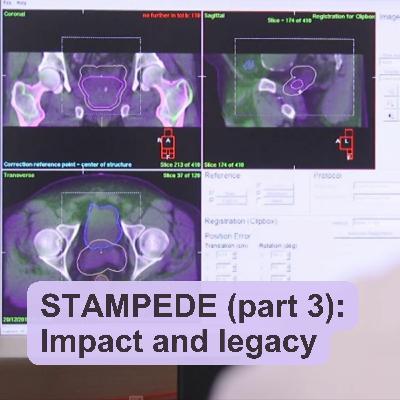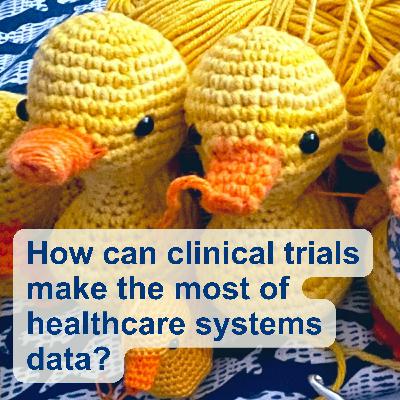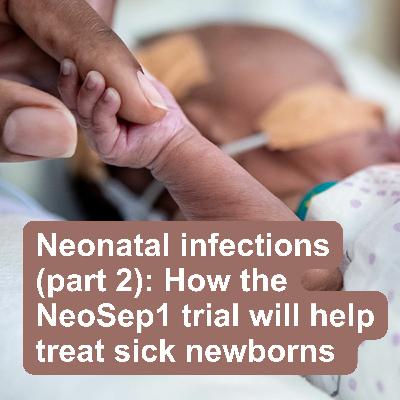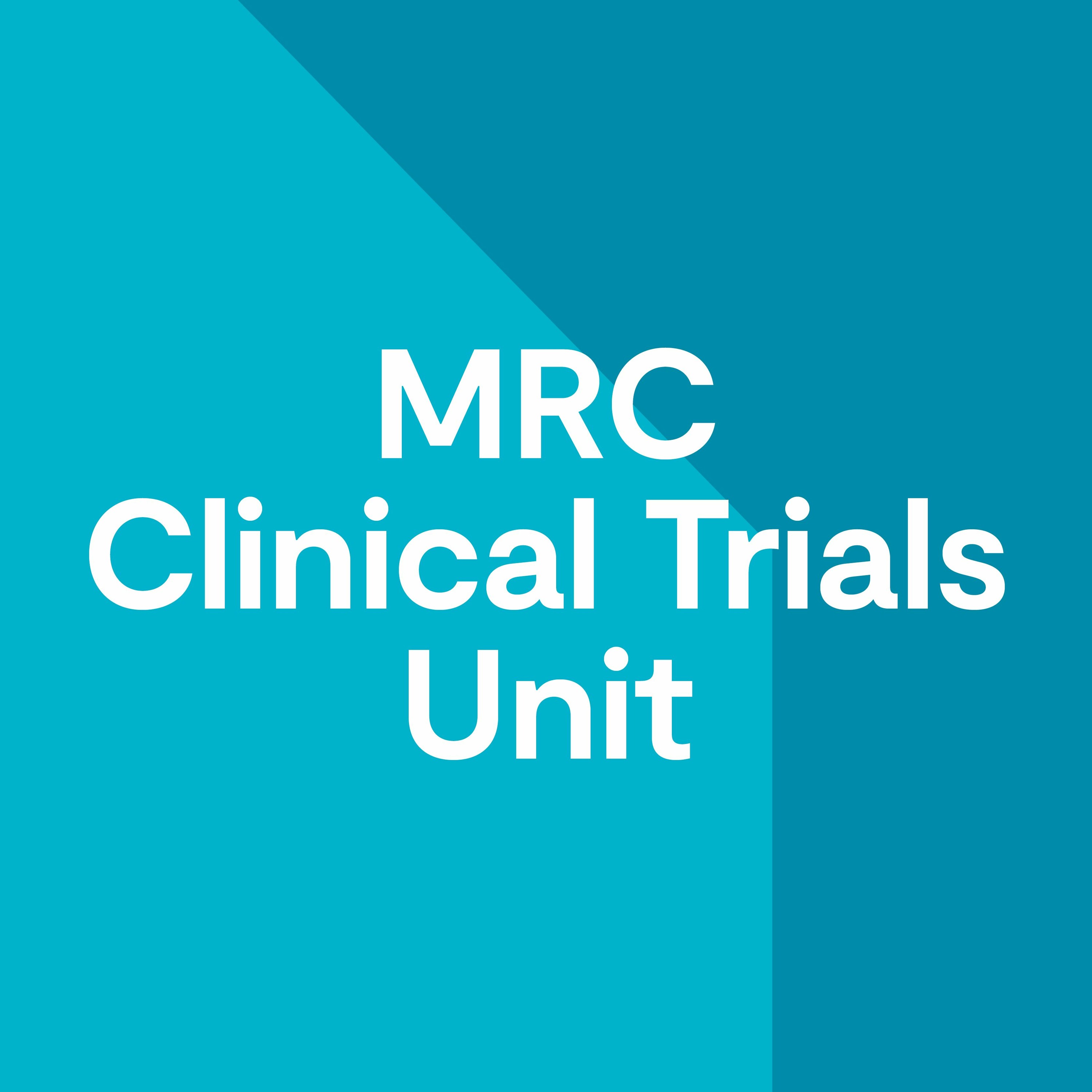Discover MRC CTU Podcasts
MRC CTU Podcasts

MRC CTU Podcasts
Author: MRC Clinical Trials Unit at UCL
Subscribed: 9Played: 8Subscribe
Share
© All rights reserved
Description
The Trial Talk podcast explores how our work at the MRC Clinical Trials Unit at UCL is improving health in the UK and worldwide. In this series, we hear from world-leading experts about the studies we carry out. We delve into trials on cancer, infections and neurodegenerative diseases, explore how public and patient involvement shapes our work, and discover new ways to run smarter studies.
25 Episodes
Reverse
At the start of October, lots of the Unit’s clinical trials methodology researchers travelled to Edinburgh, for the 7th International Clinical Trials Methodology Conference (ICTMC).
ICTMC is the largest academic-led conference on clinical trials, bringing together trialists from across the globe to present their latest work in trials methodology. This year's conference featured a wide variety of workshops, talks and poster presentations from MRC Clinical Trials Unit researchers.
In this latest episode of the Trial Talk podcast, four of the Unit’s early career researchers discuss the work they presented at ICTMC 2024.
Gideon Darko Asamoah tells us how he will deliver a core outcome set for trials in severe malaria; Jingyi Xuan describes her project addressing intercurrent events in platform trials; Dongquan Bi discusses the effects of different cluster sizes in cluster trials; and finally, Kate Roberts explains how she aims to improve the wording around consent for accessing trial participants' healthcare records.
For questions or feedback on the series, message us at mrcctu.engage@ucl.ac.uk
For more information and to access the transcript: https://bit.ly/4f9grVi
As a listener, your opinion is very valuable to us. Please help us to improve the podcast in future by filling in this short survey: forms.office.com/e/PjfjQ5Mn6g
More resources:
• Developing a core outcome set for severe malaria trials poster: https://www.mrcctu.ucl.ac.uk/posters/identifying-a-comprehensive-long-list-of-outcomes-for-developing-a-core-outcome-set-for-severe-malaria-treatment-trials-a-systematic-review-and-inclusion-of-outcomes-important-to-patients-and-caregivers/
• Specifying estimands and estimators in trials with complex designs poster: https://www.mrcctu.ucl.ac.uk/posters/specifying-estimands-and-estimators-in-trials-with-complex-designs/
• Demystifying estimands in cluster-randomised trials paper in Statistical Methods in Medical Research: https://journals.sagepub.com/doi/10.1177/09622802241254197
• Estimands in cluster-randomised trials paper in International Journal of Epidemiology: https://academic.oup.com/ije/article/52/1/107/6644521
• Current practice around the use of estimands in cluster randomised trials, and the impact of informative cluster size on inference poster: https://www.mrcctu.ucl.ac.uk/posters/current-practice-around-the-use-of-estimands-in-cluster-randomised-trials-and-the-impacts-of-informative-cluster-size-on-inferences/
• ICTMC 2024 Poster 167 – A rap song (Lyrics by Dongquan Bi, beat by David Fitzgerald): https://youtu.be/s7qZ5TnOlWU?si=iXwfFfSAWwJ-fAmk
• CrossWord poster: https://www.mrcctu.ucl.ac.uk/posters/crossword-consent-to-access-and-use-healthcare-systems-data-for-clinical-trials-a-review-of-current-language-in-participant-facing-materials/
UKCTOCS (UK Collaborative Trial of Ovarian Cancer Screening) is one of the largest screening trials in ovarian cancer. More than 200,000 women from England, Wales and Northern Ireland took part in it, and it ran for almost two decades. Designing and running such a large and lengthy trial came with its own challenges. In this episode, Professor Usha Menon discusses the key challenges that UKCTOCS faced in its design, conduct an analysis, and how the team addressed them.
Further information is available on the UKCTOCS website at https://ukctocs.mrcctu.ucl.ac.uk/
Listen to the episode about the UKCTOCS trial results at https://bit.ly/48pK94J
For questions or feedback on the series, message us at mrcctu.engage@ucl.ac.uk
For more information and to access the transcript: https://bit.ly/45XRyWT
As a listener, your opinion is very valuable to us. Please help us to improve the podcast in the future by filling in this short survey: forms.office.com/e/PjfjQ5Mn6g
In the first episode of our new Trial Talk series, Hanif Esmail and Conor Tweed take over the microphones to interview Andrew Nunn and Sarah Meredith, who have both recently retired from the Unit, having spent a combined total of 92 years working in the field of tuberculosis (TB).
As we celebrate Andrew and Sarah’s long and accomplished careers, we’ll dive into the history of TB clinical trials and muse on the future of TB research.
For more information and to access the transcript: https://www.mrcctu.ucl.ac.uk/news/news-stories/2024/january/new-podcast-episode-careers-in-tb-clinical-trials/
Check out our earlier podcast episodes about TB trials, also featuring Andrew Nunn:
• https://soundcloud.com/trial-talk-podcast/the-stream2-trial-how-should-we-treat-multi-drug-resistant-tuberculosis?si=013c930cbd184b7a93b64eb7101e57be&utm_source=clipboard&utm_medium=text&utm_campaign=social_sharing
• https://soundcloud.com/trial-talk-podcast/andrew-nunn-talks-medical-statistics-tb-and-algerian-nomads-part-1?si=6b8c8c2da31a45fba323adbdd97c1f1b&utm_source=clipboard&utm_medium=text&utm_campaign=social_sharing
• https://soundcloud.com/trial-talk-podcast/andrew-nunn-talks-medical-statistics-tb-and-algerian-nomads-part-2?si=1723fbebd5d746079dddb12a139f0eed&utm_source=clipboard&utm_medium=text&utm_campaign=social_sharing
For questions or feedback on the series, message us at mrcctu.engage@ucl.ac.uk
As a listener, your opinion is very valuable to us. Please help us to improve the podcast in the future by filling in this short survey: forms.office.com/e/PjfjQ5Mn6g
Every year on 1st December, we mark World AIDS Day to show solidarity in the fight against HIV and AIDS, and to remember those who have sadly lost their lives.
Since the start of the global AIDS epidemic in the 1980s, researchers have made enormous progress towards preventing HIV transmission, and treating those who are living with HIV so that the virus remains suppressed. But while there have been marked improvements for adults, treatment coverage in children and adolescents is lagging behind.
In the second of our World AIDS Day episodes, we highlight the important role that young people living with HIV play in research, by shaping clinical trials to better serve the needs of their community.
This episode features Lungile Jafta, who works closely with young people through Penta’s youth engagement programmes, and Gugu, a former Youth Trials Board member from South Africa who is living with HIV.
For more information and to access the transcript: https://www.mrcctu.ucl.ac.uk/news/news-stories/2023/december/trial-talk-podcast-releases-new-episodes-for-world-aids-day/
For questions or feedback on the series, message us at mrcctu.engage@ucl.ac.uk
As a listener, your opinion is very valuable to us. Please help us to improve the podcast in the future by filling in this short survey: forms.office.com/e/PjfjQ5Mn6g
Every year on 1st December, we mark World AIDS Day to show solidarity in the fight against HIV and AIDS, and to remember those who have sadly lost their lives.
Since the start of the global AIDS epidemic in the 1980s, researchers have made enormous progress towards preventing HIV transmission, and treating those who are living with HIV so that the virus remains suppressed. But while there have been marked improvements for adults, treatment coverage in children and adolescents is lagging behind.
In the first of our World AIDS Day episodes, Dr Anna Turkova, Clinical Principal Research Fellow at the MRC Clinical Trials Unit at UCL, and Philippa Musoke, Professor of Paediatrics and Child Health at Makerere University, explore the reasons for these disparities and how the MRC CTU at UCL is working to close the gap between adults and children through clinical trials.
For more information and to access the transcript: https://www.mrcctu.ucl.ac.uk/news/news-stories/2023/december/trial-talk-podcast-releases-new-episodes-for-world-aids-day/
For questions or feedback on the series, message us at mrcctu.engage@ucl.ac.uk
As a listener, your opinion is very valuable to us. Please help us to improve the podcast in the future by filling in this short survey: forms.office.com/e/PjfjQ5Mn6g
Octopus is a new clinical trial for people living with progressive multiple sclerosis (MS), which is designed and run by the MRC Clinical Trials Unit at UCL. Thanks to its multi-arm multi-stage platform design, Octopus has the potential to transform the way treatments for progressive MS are tested. The trial is now open in the UK and will be recruiting participants for the next few years.
The podcast mini-series will explore the trial from different perspectives by talking to neurologists, MS experts and people affected by MS.
In the final part, we explore the role of people affected by MS in the Octopus trial. Susan Scott, a pharmaceutical publications specialist and Octopus patient representative, shares her involvement in the trial and explains how PPI has benefited Octopus so far.
-
For more information and to access the transcript: bit.ly/3S6FKP4
For questions or feedback on the series, message us at mrcctu.engage@ucl.ac.uk
As a listener, your opinion is very valuable to us. Please help us to improve the podcast in the future by filling in this short survey: forms.office.com/e/PjfjQ5Mn6g
Octopus is a new clinical trial for people living with progressive multiple sclerosis (MS), which is designed and run by the MRC Clinical Trials Unit at UCL. Thanks to its multi-arm multi-stage platform design, Octopus has the potential to transform the way treatments for progressive MS are tested. The trial is now open in the UK and will be recruiting participants for the next few years.
The podcast mini-series will explore the trial from different perspectives by talking to neurologists, MS experts and people affected by MS.
In Part 3, MS experts Dawn Lyle and Matthew Justin walk us through the journey that trial participants take when taking part in Octopus, from how to register your interest in the trial, to what to expect on your first visit.
-
For more information and to access the transcript: bit.ly/3S6FKP4
For questions or feedback on the series, message us at mrcctu.engage@ucl.ac.uk
As a listener, your opinion is very valuable to us. Please help us to improve the podcast in the future by filling in this short survey: forms.office.com/e/PjfjQ5Mn6g
Octopus is a new clinical trial for people living with progressive multiple sclerosis (MS), which is designed and run by the MRC Clinical Trials Unit at UCL. Thanks to its multi-arm multi-stage platform design, Octopus has the potential to transform the way treatments for progressive MS are tested. The trial is now open in the UK and will be recruiting participants for the next few years.
The podcast mini-series will explore the trial from different perspectives by talking to neurologists, MS experts and people affected by MS.
Part 2 of the series explores our Octopus trial in depth. Professor Jeremy Chataway, lead investigator of Octopus, discusses its novel design, the treatments it will test, and the criteria for people to take part. He also explains the data researchers will collect and analyse to find out if a treatment is working.
-
For more information and to access the transcript: bit.ly/3S6FKP4
For questions or feedback on the series, message us at mrcctu.engage@ucl.ac.uk
As a listener, your opinion is very valuable to us. Please help us to improve the podcast in the future by filling in this short survey: forms.office.com/e/PjfjQ5Mn6g
Octopus is a new clinical trial for people living with progressive multiple sclerosis (MS), which is designed and run by the MRC CTU at UCL. Thanks to its multi-arm multi-stage platform design, Octopus has the potential to transform the way treatments for progressive MS are tested. The trial is now open in the UK and will be recruiting participants for the next few years.
The podcast mini-series will explore the trial from different perspectives by talking to neurologists, MS experts and people affected by MS.
Part 1 covers the treatment and research landscape of MS and the challenges of treating progressive MS. It features Jeremy Chataway, neurologist at the National Hospital for Neurology and Neurosurgery at UCLH, Professor of Neurology at UCL and co-lead of the Neurodegenerative Diseases progamme at the MRC CTU at UCL, who is leading the Octopus trial. We also hear from Dawn Lyle, Lead Research MS Nurse, and Matthew Justin, MS Specialist, who are based at the Anne Rowling Regenerative Neurologic Clinic in Edinburgh.
-
For more information and to access the transcript: https://bit.ly/3S6FKP4
For questions or feedback on the series, message us at mrcctu.engage@ucl.ac.uk
As a listener, your opinion is very valuable to us. Please help us to improve the podcast in the future by filling in this short survey: forms.office.com/e/PjfjQ5Mn6g
Innovative platform designs present an opportunity to run faster and more efficient clinical trials.
Clinical trials methodology is a research area that looks at how to improve the design, conduct, and analysis of clinical trials. It focuses on developing and implementing new methods to help run trials faster and more efficiently, that will ultimately accelerate the discovery of new treatments.
In this episode, methodologist Matteo Quartagno tells us about a new clinical trial design called MAMS-ROCI. It is a type of multi-arm multi-stage design that compares a range of different treatment durations, dose or frequencies to identify the optimal one.
-
For questions or feedback on the series, message us at mrcctu.engage@ucl.ac.uk
For more information and to access the transcript: https://bit.ly/3ZpyKhG
As a listener, your opinion is very valuable to us. Please help us to improve the podcast in the future by filling in this short survey: forms.office.com/e/PjfjQ5Mn6g
STAMPEDE is a long-running trial in advanced prostate cancer, in which nearly 12,000 men have taken part. Thanks to its multi-arm multi-stage platform design, STAMPEDE has tested many different treatments and directly led to improvements in the standard of prostate cancer care several times.
This Trial Talk podcast mini-series will explore the trial’s journey from its inception in the early 2000s to the end of patient recruitment in March 2023.
In the final part, Max Parmar and Nick James look back over the trial’s impact on clinical practice and platform trial design and look forward to STAMPEDE2, sharing their hopes for the future of prostate cancer research.
-
Further information is available on the STAMPEDE study page at www.mrcctu.ucl.ac.uk
For questions or feedback on the series, message us at mrcctu.engage@ucl.ac.uk
For more information and to access the transcript: bit.ly/3OQWhV8
As a listener, your opinion is very valuable to us. Please help us to improve the podcast in future by filling in this short survey: forms.office.com/e/PjfjQ5Mn6g
STAMPEDE is a long-running trial in advanced prostate cancer, in which nearly 12,000 men have taken part. Thanks to its multi-arm multi-stage platform design, STAMPEDE has tested many different treatments and directly led to improvements in the standard of prostate cancer care several times.
This Trial Talk podcast mini-series will explore the trial’s journey from its inception in the early 2000s to the end of patient recruitment in March 2023.
Part 2 is about patient and public involvement (PPI) in the trial. David Matheson, a Reader at the University of Wolverhampton and STAMPEDE patient representative, shares his insight into the work this entails and why it is so important to champion the voices of patients. We also hear about PPI from the perspective of trial researchers, Max Parmar and Nick James.
-
Further information is available on the STAMPEDE study page at www.mrcctu.ucl.ac.uk
For questions or feedback on the series, message us at mrcctu.engage@ucl.ac.uk
For more information and to access the transcript: bit.ly/3OQWhV8
As a listener, your opinion is very valuable to us. Please help us to improve the podcast in future by filling in this short survey: forms.office.com/e/PjfjQ5Mn6g
STAMPEDE is a long-running trial in advanced prostate cancer, in which nearly 12,000 men have taken part. Thanks to its multi-arm multi-stage platform design, STAMPEDE has tested many different treatments and directly led to improvements in the standard of prostate cancer care several times.
This Trial Talk podcast mini-series will explore the trial’s journey from its inception in the early 2000s to the end of patient recruitment in March 2023.
Part 1 covers the landscape of prostate cancer treatment before STAMPEDE, as well how the trial was designed, featuring two researchers who lead the methodological and clinical sides of the trial: Max Parmar, Professor of Medical Statistics and Epidemiology and Director of the MRC Clinical Trials Unit at UCL and UCL's Institute of Clinical Trials and Methodology, and Nick James, Professor of Prostate and Bladder Cancer Research at the Institute of Cancer Research.
-
Further information is available on the STAMPEDE study page at www.mrcctu.ucl.ac.uk
For questions or feedback on the series, message us at mrcctu.engage@ucl.ac.uk
For more information and to access the transcript: https://bit.ly/3OQWhV8
As a listener, your opinion is very valuable to us. Please help us to improve the podcast in future by filling in this short survey: forms.office.com/e/PjfjQ5Mn6g
Immunotherapy drugs fight cancer by helping the immune system recognise and attack cancer cells. These drugs have revolutionised cancer treatment over the last decade, improving survival for many people with different types of cancer. However, researchers are still unsure of the best way to give immunotherapy, which can come with unpredictable side effects.
In this episode, Clinical Fellow Sophie Merrick discusses how the REFINE trial hopes to address this problem, by testing if giving immunotherapy less frequently can still treat the cancer effectively, whilst improving the quality of life for patients, reducing side effects and costs.
-
Further information is available on the REFINE study page at www.mrcctu.ucl.ac.uk
For questions or feedback on the series, message us at mrcctu.engage@ucl.ac.uk
For more information and to access the transcript: https://bit.ly/3DgIDE2
As a listener, your opinion is very valuable to us. Please help us to improve the podcast in future by filling in this short survey: https://forms.office.com/e/PjfjQ5Mn6g
Running a clinical trial means collecting a lot of data from the trial participants. But some of this data might be collected and stored in healthcare systems, as well as in clinical trial case report forms.
What if we could avoid this doubling up, save time and resources, improve recruitment and reduce missing data?
In this episode we explore the opportunities and challenges of using healthcare systems data in clinical trials, with Dr Macey Murray and Professor Matt Sydes.
Resources:
British Heart Foundation Data Science Centre webinar (Macey Murray) - https://www.youtube.com/watch?v=OzQeMUUG7tQ
How to get your own crocheted duck - https://twitter.com/drmakerbaker/status/1628122224971419665?s=20
For more questions or feedback on the series, contact us at mrcctu.engage@ucl.ac.uk
For more information and access to the transcript of this episode: https://bit.ly/3NKtKjs
As a listener, your opinion is very valuable to us. Please help us to improve the podcast in future by filling in this short survey: https://forms.office.com/e/PjfjQ5Mn6g
Neonatal sepsis is a life-threatening infection that affects up to 3 million babies per year globally.
In an effort to identify better treatments, the NeoSep1 clinical trial evaluates new antibiotic combinations for newborn babies with sepsis. To learn more about the trial, we speak to Adrie Bekker and Cristina Obiero, principal investigators of the trial in South Africa and Kenya, Reenu Thomas, a neonatologist from South Africa, and Francesca Schiavone, the clinical project manager of the NeoSep1 trial in London.
-
Further information about the NeoSep1 clinial trial is available at www.mrcctu.ucl.ac.uk and https://gardp.org/.
For questions or feedback on the series, message us at mrcctu.engage@ucl.ac.uk
For more information and to access the transcript: https://bit.ly/3MSKkw5
As a listener, your opinion is very valuable to us. Please help us to improve the podcast in future by filling in this short survey: https://forms.office.com/e/PjfjQ5Mn6g
214,000 newborn babies die of sepsis caused by infections that are resistant to antibiotics every year. This is a major problem worldwide, but disproportionally affects low- and middle- income countries.
Reenu Thomas and Adrie Bekker, two neonatologists from South Africa, and Francesca Schiavone, clinical project manager at the MRC CTU at UCL in London, discuss the challenges of treating neonatal sepsis and present the results from an observational study (NeoOBS), which assessed mortality rates of babies with sepsis.
Further information about the NeoOBS study is available at www.mrcctu.ucl.ac.uk and https://gardp.org/.
For questions or feedback on the series, message us at mrcctu.engage@ucl.ac.uk
For more information and to access the transcript: https://bit.ly/45zdn0j
As a listener, your opinion is very valuable to us. Please help us to improve the podcast in future by filling in this short survey: https://forms.office.com/e/PjfjQ5Mn6g
For World TB Day, this episode explores the global burden of tuberculosis (TB) and how growing antibiotic resistance can complicate treatment options. Andrew Nunn, a Professor of Epidemiology, discusses his work on the STREAM2 trial, which investigated how treatment for multi-drug resistant TB could be shortened and made more acceptable for patients.
Further information is available on the STREAM Stage 2 study page at www.mrcctu.ac.uk and results from STREAM2 are published open access in The Lancet.
For questions or feedback on the series, message us at mrcctu.engage@ucl.ac.uk
For more information and to access the transcript: http://bit.ly/3TDnz24
As a listener, your opinion is very valuable to us. Please help us to improve the podcast in future by filling in this short survey: https://forms.office.com/e/PjfjQ5Mn6g
Around 4000 women die of ovarian cancer in the UK each year. It is often diagnosed at an advanced stage, making treatment difficult. The UK Collaborative Trial of Ovarian Cancer Screening, known as the UKCTOCS trial, followed up more than 200,000 women over an average of 16 years, in an effort to improve diagnosis of ovarian cancer. This podcast episode explores the long-term results of the trial.
Andrew Nunn joined the MRC’s Tuberculosis & Chest Diseases Unit as a statistician in 1966. During the next 20 years he was directly involved in the design, conduct and analysis of the programme of trials conducted under the leadership of Professors Wallace Fox and Denny Mitchison in East Africa, Hong Kong and Singapore which led to the worldwide adoption of short course chemotherapy for tuberculosis.
Following the closure of that unit he joined the MRC’s Uganda AIDS Programme which researched the dynamics of the HIV epidemic in a rural African environment. On his return to the UK he became head of the Division Without Portfolio within the newly formed MRC Clinical Trials Unit with responsibility for developing trials in neglected areas.
Andrew is Co-Chief Investigator of STREAM, the first randomised controlled-trial of a treatment regimen for multi-drug resistant TB. In the context of treatment guidelines based on ‘very low quality’ evidence, Andrew designed STREAM to generate gold-standard evidence on the safety and efficacy of the promising 9-month short-course regimen previously evaluated only in observational studies. The trial has subsequently been adapted to test a bedaquiline-containing oral regimen.


